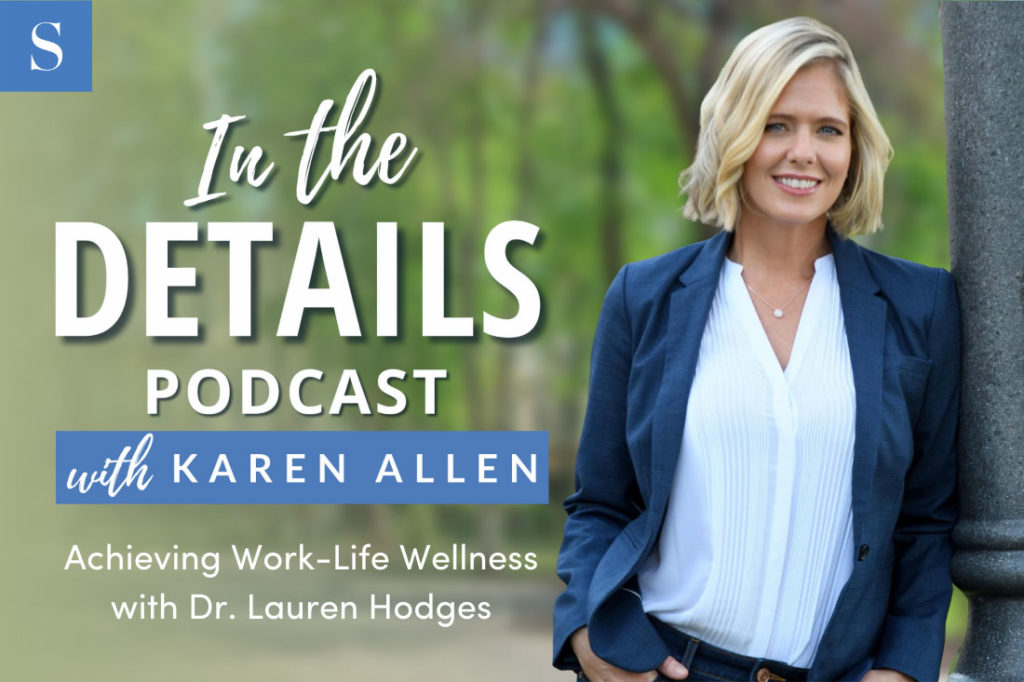If you’re a current or former athlete, you likely are familiar with putting in effort on a bike, run or swim that nets you an output, which increases your performance potential. When we translate that type of drive and practice into training our minds for success, it reveals many other factors that influence our ability to show up at our best. This week, In the Details host Karen Allen spoke with Dr. Lauren Hodges about how shifting this performance mindset, starting small and creating space for awareness can help us manage stress and find greater energy and purpose.
In the Details with Karen Allen is no longer releasing new episodes on the SUCCESS Podcast Network, but you can still listen to the full conversation below.

Train your body, train your mind
Hodges came from a fitness background, and as she immersed herself into the corporate wellness arena, she found that many other variables impact our ability to draw from different reservoirs of energy. Humans are multidimensional; our thoughts, emotions, sleep, diet and pursuit of a purpose are what help us find success. Each variable also influences the other. This learning was key for Hodges and her clients, as it enabled her to realize that building good habits and healthy boundaries needed to encompass so much more than just training for the task at hand. Therefore, her mindset shifted from reactive to being intentional and responsive.
Practice small lifts
So how exactly do we begin committing to training our minds for success? By starting small—even just one day during the week. Choose a time that may already be flexible for you, and carve it out and protect it. Then, give yourself the gift of pause, so that you can decide in the moment how it’s best for you to spend that time, whether it’s journaling, hydrating, meditating or another activity.
By creating that pause, you’ll begin not feeling pushed toward the habit, but getting pulled toward it. You might even find yourself wanting to add another day or two as you see the benefits of rest and strategic recovery—it really does contribute to productivity! But first you must learn how to simply be, and not do.
The great reset
The pandemic helped us all put wellness at the center of our success. Many people often cite the Great Resignation as a key result of what we all went through, because the pandemic urged us to really assess how we were living and what we wanted for our future.
When you find yourself in a moment of stress or deep sadness, like the pandemic, it’s important to have a toolkit you can go to—resources that can help you to come out on the other side. And you can then stand in that stressful space with confidence because you’ve already built your approaches for success.
Hodges believes it’s key to first identify the thought, emotion and behavior patterns of negative stress so that we may intervene early, determine the tools that will help manage it, and reduce our chances of a mental health crisis.
Make social media work for you
Who you follow on social media can direct your values. So follow those who inspire you and whom you trust—surround yourself with that positivity. Hodges engages with accounts that make her feel good, so that she can see what others are doing and try it on for size with herself—whether that’s exercising, writing in a worry journal or seeing a therapist.
On the flip side, she also tries to reduce the noise by not following accounts that aren’t in alignment with her growth goals.
How to bring yourself back on track
It’s critical to build awareness of energy vampires—things that derail you and get you out of alignment with your purpose and values. For Hodges, that’s insufficient sleep and multiple competing priorities with similar deadlines. By creating a pause after these energy vampires strike, she’s able to bring awareness to them and design an intervention.
In Hodges’ case, that’s using a sleep tracker and keeping consistent bedtime and morning routines to manage her sleep. And since she’s now aware that multiple priorities throw her into negative self-talk and feelings of impostor syndrome, she shifts to talking to encouraging people and using delegation practices when those stressors arise.
And remember…
This growth is not an either-or, black-and-white journey but rather a continuous one. You may feel derailed 30% of the week, and also high-performing and successful. You are enough, and you can find contentment with being not finished or perfect—because it’s more about the practice of just being.




